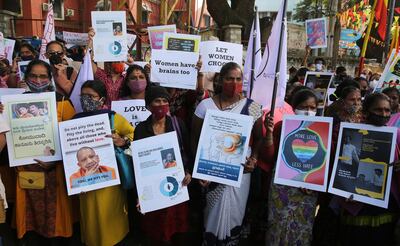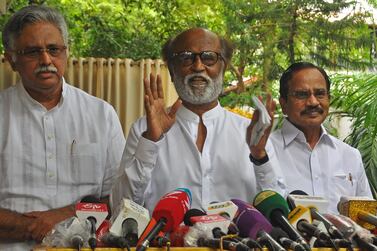Police in India’s Uttar Pradesh state have arrested a Muslim man over allegations that he tried to convert a Hindu woman to Islam.
His arrest marks the first detention under a controversial new law that makes religious conversion for marriage a crime.
The Prohibition of Unlawful Conversion of Religion Ordinance was passed into law last week in the north Indian state, led by a Hindu monk and politician, Yogi Adityanath.
The legislation is considered to be a response to a Hindu right-wing conspiracy theory that makes unfounded claims of Muslim men maliciously luring Hindu women into relationships to convert them to Islam.
Owais Ahmad, 21, was arrested on Wednesday in Bareilly district of the state after a Hindu woman’s father accused him of “threatening to kidnap and forcefully convert her faith from Hinduism to Islam”.
"The case was registered by Tikaram, the father of the girl who alleged that Owais tried to forcefully convert his daughter by kidnapping and marrying her," Sansar Singh, a senior police officer in Bareily station, told The National.
Mr Ahmad is not eligible for bail and if convicted could face up to 10 years in prison and a fine of 50,000 rupees ($675).
He and the unidentified woman were in a relationship for several years before they tried to elope nearly three years ago.
The woman’s family found her on the day she disappeared and the pair never married.
They soon after ended their relationship, but the incident sparked police complaints before the woman’s father filed a case under the new law last weekend.
Police said the woman was married to a Hindu man in June.

Her father claimed in his complaint that Mr Ahmad had tried to convert the woman three years ago through “allurement and coercion”.
They are two of several controversial clauses in the law that the converted spouse’s partner must prove did not take place.
Under the law, any marriage deemed to be for the sole purpose of conversion will be “deemed null and void”, unless a prior state sanction has been granted to convert.
The conspiracy theory found its way into public consciousness in recent weeks, mostly from leaders of Prime Minister Narendra Modi’s Hindu nationalist Bharatiya Janata Party and states where it is in power.
Four states ruled by the BJP are considering similar legislation to outlaw marriages in which one spouse converts to another faith before or after the marriage.
They are seemingly under pressure from Hindu groups making unfounded claims that Muslim men are duping unsuspecting Hindu women into marriage with the sole aim of converting them to Islam.
In October this year, a popular jewellery brand withdrew a TV advertisement featuring an interfaith couple celebrating their baby-shower ceremony after facing backlash and even physical attacks from Hindu right-wing groups.
But officially, the term “forced conversions” for marriage is not recognised by the government.
Critics say the new law is aimed at dissuading interfaith marriages and is likely to be used to victimise Muslims and women.
"This law will not stand the test of constitutionality because the constitution allows an adult to choose a partner," Madhu Mehra, a Delhi lawyer and women's rights activist, told The National.
"It is a personal decision even if it is against family approval.
Ms Mehra said the law went against the right to religious freedom which is "an individual and collective right".
Eight Indian states have laws that prohibit religious conversion through pressure or enticement.
This legislation was mainly aimed at stopping the conversion of underprivileged Hindu tribal people by Christian missionaries involved in charity work.
Soon after independence, India tried to pass a similar law nationally but failed to gather parliamentary support.
Some BJP leaders have also made unsuccessful attempts to introduce similar bills to ban any conversion in the officially secular country.
Last month Mr Adityanath issued open threats to Muslim men at a public rally, asking them to respect the dignity of Hindu women or else “prepare for their funeral journey”.
India has a population of 200 million Muslims and interfaith marriages come with strong and often deadly responses from society and police.
Religious laws govern marriages and personal matters in India, forcing couples to convert to the same faith or opt for a Special Marriage Act.
That is tedious, month-long court process that includes declaring the marriage intention and seeking permission from the state.
Last month, Uttar Pradesh’s High Court ruled that an interfaith couple was well within the law to marry and live happily.
The court asked state police to quash the kidnapping case brought against a Muslim man by a Hindu woman’s family after she voluntarily converted to Islam and married him.
The court also overruled a previous order that said conversion for marriage was illegal.
“In giving the right to family members to complain, and by not allowing the woman the right to discharge the burden of proof, this ordinance absolutely undermines a woman's right to choose a spouse,” Ms Mehra said.
“It will, unfortunately, create an environment where couples may avoid legal marriages and enter de facto marriages or unions.
"This will push relationships underground, undermine women's matrimonial rights and ultimately create more ways of harassing and punishing [couples].”






